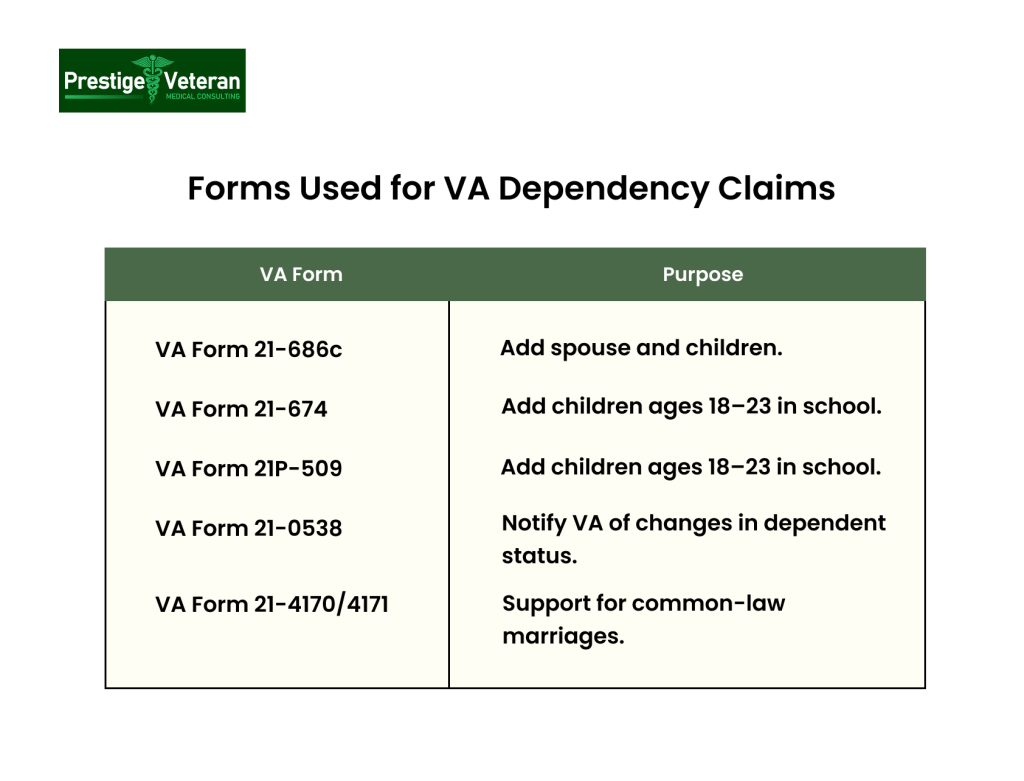When you have served your country and are receiving VA disability compensation, you may be eligible to receive additional financial support if you have qualifying dependents. This not only helps support your loved ones but also acknowledges the increased financial responsibilities many veterans face. But who qualifies as a VA dependent? Let’s break down the eligibility criteria to become a veteran dependent, the available benefits, and the process to add or change dependents in a VA claim.
Table of Contents
What Is a Dependent of a Veteran?
A VA dependent is a family member, either a spouse, child, or parent, who relies on you financially and meets specific eligibility criteria established by the Department of Veterans Affairs (VA). Adding a dependent can increase your monthly VA disability compensation, reflecting the added responsibilities that come with supporting loved ones.
To receive VA benefits for dependents, a Veteran must meet specific eligibility criteria:
- Be eligible for VA disability compensation
- Hold a combined VA disability rating of 30% or higher
This is commonly known as the “30% rule.” Veterans with a disability rating below 30% do not qualify for extra compensation for their VA dependents.
Who Qualifies as a Dependent for VA Disability?
Let’s take a deeper look into each category of dependent and what makes someone eligible.
1. Spouse
The VA acknowledges a Veteran’s spouse as an eligible dependent. It recognizes various types of marriages, including:
- Legal marriages (traditional, civil, or religious)
- Common-law marriages (if legal in the state where they occurred)
- Same-sex marriages
- Tribal or proxy marriages (with supporting documentation)
If your spouse requires Aid and Attendance due to illness or disability, you may be eligible for additional compensation. Adding a spouse is usually done by submitting VA Form 21-686c.
2. Children
A child may be eligible to be added as a veteran’s dependent if they meet one or more of the specific requirements:
- Under 18 years old
- Between 18 and 23 years old and attending school full time
- A child of any age, if permanently disabled before the age of 18
- Became permanently disabled before age 18
This includes biological children, stepchildren, and adopted children. Veterans looking to add qualifying children as dependents should review VA Form 21-686c. If the child is between 18 and 23 years old and is enrolled in school, you may submit VA Form 21-674 (Request for Approval of School Attendance).
3. Parents
You can add a parent as a dependent on a VA benefits claim if you:
- Have biological, adoptive, or foster parents who stood in a parental role before your military service
- Are financially responsible for their care
- Can prove your parent’s income and net worth fall below the VA’s legal limit
This benefit requires completing VA Form 21P-509 (Statement of Dependency of Parent(s)). In cases involving elderly or low-income parents, understanding the legal limit of parent VA disability requirements is essential to avoid denial due to financial ineligibility.
What is the Income Limit for a VA Dependent Parent?
Presently, under 38 CFR § 3.250, a parent is conclusively considered a dependent of a veteran for VA compensation if income is:
- $400/month or less in income as a single parent living alone
- $660/month or less for both parents or a remarried parent and spouse living together
- Plus $185/month for each additional family member the parent is legally or morally obligated to support
However, if income is slightly above the legal limit but essential expenses such as housing, food, or medical care are higher, VA dependent benefits may still be approved.
When questions arise with your VA claim or dependent eligibility, a VA-accredited representative can guide you in your situation.
How Much Additional Compensation Can Veterans Receive?
The dependent pay for VA disability is usually based on your total disability rating, the type of dependent, and the number of dependents. For example:
- At a 30% disability rating, adding a spouse increases your monthly compensation from $524.31 to $586.31, providing an additional $62 each month.
- A veteran with a 50% disability rating, a spouse, and one child receives $1,228.47 per month, $208.31 more than a single veteran at the same rating.
Additional dependent allowances, like $74/month for each extra child under 18 years old, may apply as well. Get information about the latest pay rates for VA disability compensation here.
What VA Benefits Can Dependents of Veterans Receive?
Once dependents of veterans are added, they may be eligible for multiple benefits that help ease the financial and emotional burden related to service-connected disabilities.
Increased Monthly Compensation
Veterans may receive an increased amount of monthly VA compensation based on the number and type of dependents. This additional payment supports spouses, children (including stepchildren), and dependent parents, offering essential financial relief to families managing the daily impact of a service-connected disability.
Dependency and Indemnity Compensation (DIC)
Dependency and Indemnity Compensation (DIC) provides monthly tax-free payments to surviving spouses, children, or even parents of veterans who passed away due to a service-connected condition or while on active duty. In some cases, DIC is also available if the veteran had a 100% disability rating for a set period before their death.
Survivor’s Pension
Survivor’s Pension offers a needs-based, tax-free monthly pension to low-income surviving spouses and dependent children of wartime veterans. Eligibility for these VA dependent benefits hinges on income and net worth limits, ensuring support for those with the greatest financial need.
CHAMPVA Health Care
CHAMPVA (Civilian Health and Medical Program of the Department of Veterans Affairs) is a VA benefit available to spouses and children of veterans rated permanently and totally disabled. This VA dependent benefit covers essential medical services, prescriptions, mental health care, and supplies. Healthcare for children is covered until age 18, or 23 if they are full-time students, while spouses remain eligible unless they remarry before age 55.
Educational Benefits
Education Assistance programs such as the Survivors’ and Dependents’ Educational Assistance (DEA) Program, also known as Chapter 35, and the Fry Scholarship provide up to 36 months of educational benefits for VA dependents pursuing college degrees, apprenticeships, vocational training, or licensing. These benefits offer a pathway to independence and long-term career success.
Home Loan Benefits
Home Loan Benefits extend to some surviving spouses, allowing them to purchase, refinance, or improve a home with favorable VA-backed loans.
Burial and Memorial Benefits
Spouses and dependent children of eligible veterans may receive VA memorial benefits, including burial in a national cemetery, perpetual gravesite care, a government-provided headstone or marker, a burial flag, and a Presidential Memorial Certificate. Even if they pass away before the veteran, they remain eligible for these dignified honors and possible burial allowances.
Aid and Attendance
Aid and Attendance provides additional financial help for surviving spouses who are bedridden and require help with daily living tasks, such as bathing, dressing, eating, and mobility, further easing long-term care costs.
Together, these VA dependent benefits help ensure that a veteran’s dependents receive the ongoing support they deserve.
How to Add Dependents to VA Disability Payments

Veterans can add dependents to VA disability benefits either during their initial claim or afterward, once their combined rating reaches at least 30%. You must file specific forms, depending on the type of dependent you want to add.
Here are the necessary steps to adding dependents to VA disability compensation according to VA.gov:
Spouse or Child Under 18:
- Use VA Form 21-686c (Declaration of Status of Dependents)
- Submit the dependency claim online via VA.gov or by mail to the Evidence Intake Center
- Include supporting documents as eligibility proof (copies of marriage certificates and/or birth certificates)
Child Aged 18–23 in School:
- When filing a VA dependency claim for children, you must complete both VA Form 21-686c and VA Form 21-674
- Attach documentation from the school verifying enrollment
- Update annually to continue eligibility
Dependent Parent:
- Submit VA Form 21P-509
- Include financial documentation to prove the dependency of the parent
You can upload forms and documents faster through the VA.gov portal, which results in quicker processing, sometimes in just 48–72 hours. Moreover, you can also view or change dependents on your VA disability benefits directly through your VA.gov account.
If the VA approves your claim for dependent compensation, you can expect to start receiving payments within 2 weeks.
Consider seeking help from a qualified VA-accredited professional to make the process clearer and more manageable.
How to Change or Remove VA Dependents?
To add or remove your dependents, you can access VA.gov by signing in with a verified Login.gov or ID.me account to:
- Check which dependents are on file
- Add or remove dependents
- Submit the necessary documentation
Additional benefits for a dependent child will end automatically once they turn 18, unless you submit VA Form 21-674 to show they are still attending school.
What to do If My Family Situation Changes?
When your family situation changes (e.g., marriage, birth/adoption of a child, assuming care of a parent), you should consider updating dependent status in your VA records.
For example, if any of these occur, you should update your dependent status:
- Marriage or divorce
- Birth or adoption of a child
- Child turns 18 or finishes school
- Child gets married
- You take financial responsibility for a parent
If you file a VA claim for adding dependents within one year of the life event, you may qualify for retroactive back pay to the date of that event.
What Happens If I Don’t Notify a Dependent to the VA?
Failing to report changes such as a divorce or a child finishing school can lead to overpayment. The VA will attempt to recover those funds by withholding future benefits, which could create financial difficulties.
How Service Connection Impacts VA Dependent Benefits
Gaining access to VA dependent benefits starts with one crucial requirement: establishing a service-connected disability. Without a confirmed link between your condition and your military service, eligibility for key dependent benefits may not be possible.
This is where medical evidence, such as a well-crafted nexus letter, becomes essential. Written by a licensed medical professional, a nexus letter offers evidence-backed opinions and rationale of how a veteran’s condition is connected to their service.
An independent nexus letter, while never required can be helpful in some cases to receive VA benefits for dependents, because:
- You need a service-connected disability rating of 30% to qualify for the majority of VA dependent benefits
- Nexus letters can turn an otherwise denied claim into an approved one
- Establishing a medical nexus can unlock access to VA benefits for dependents, including CHAMPVA, educational assistance, and increased monthly payments.
If you are unsure whether your current conditions are service-connected or if your VA rating doesn’t meet the 30% threshold, a solid, professionally written nexus letter can make the difference in many cases.
With a team of expert medical professionals who understand VA requirements, Prestige Veteran can help in many cases by providing research-based medical evidence to help you establish a nexus between your military service and disability conditions.
Conclusion
Dependents, be it a spouse, child, or parent, play a crucial role in a veteran’s life. By understanding who qualifies as a dependent for VA benefits, veterans maximize the support available to their families. Whether you are newly rated or updating a long-standing claim, every dollar and every benefit counts toward creating financial stability and peace of mind.
Remember: the forms, processes, and documentation for the dependency status are there to help you, not to confuse you. And when service connection needs to be proven, a supportive nexus letter can make all the difference. If you are facing challenges with your VA claim or dependent benefits, reach out to a VA-accredited attorney or claims agent for personalized guidance.
Frequently Asked Questions (FAQs)
How do I add dependents to my VA disability?
Submit the relevant VA dependency forms either online or by mail. The fastest method is through the VA.gov portal under your profile.
What if my spouse is also a veteran?
If both you and your spouse are veterans with a disability rating of 30% or more, each of you may be eligible to receive additional compensation for one another as well as for your shared children.
Who is a dependent parent eligible for VA benefits?
For VA benefits, a dependent parent is defined as a biological, adoptive, or foster parent who relies on the veteran for financial support and meets the VA’s specific income and dependency requirements.
Can I include my stepchild under VA benefits?
Yes, a stepchild can be added to VA benefits if you are legally married to the child’s biological or adoptive parent and the child meets VA dependency requirements.
Can I receive back pay for adding dependents?
Yes, you may be eligible for back pay if you add VA dependents within one year of a qualifying life event (such as marriage, birth, or adoption) and within one year of being granted a combined disability rating of 30% or higher.
When should I add a dependent to my VA benefits?
It’s best to add a dependent when you file your initial VA claim, within a year of gaining a dependent, or once your disability rating reaches at least 30%.
Also read: VA Survivor Benefits for Spouse of 100% Disabled Veteran After Death
At Prestige Veteran Medical Consulting, a veteran-owned company, we specialize in Independent Medical Opinions (IMOs) known as Nexus letters.
Our purpose is to empower YOU, the veteran, to take charge of your medical evidence and provide you with valuable educational tools and research to guide you on your journey.
Understanding the unique challenges veterans face, our commitment lies in delivering exceptional service and support.
Leveraging an extensive network of licensed independent medical professionals, all well-versed in the medical professional aspects of the VA claims process, we review the necessary medical evidence to incorporate in our reports related to your VA Disability Claim.
Prestige Veteran Medical Consulting is not a law firm, accredited claims agent, or affiliated with the Veterans Administration or Veterans Services Organizations. However, we are happy to discuss your case with your accredited VA legal professional.














